WMG News - Latest news from WMG
Representatives from British Malaysian Chamber of Commerce visit WMG
 Dr Kogila BalakrishnanLink opens in a new window, WMG’s Director of Client and Business Development (Southeast Asia), was pleased to welcome guests from the British Malaysian Chamber of Commerce on Monday (9th September).
Dr Kogila BalakrishnanLink opens in a new window, WMG’s Director of Client and Business Development (Southeast Asia), was pleased to welcome guests from the British Malaysian Chamber of Commerce on Monday (9th September).
The delegation was made up of 15 Malaysian government officials on the JPA-BMCC Management Development ProgrammeLink opens in a new window.
The officials were particularly interested to find out more about research projects and education programmes in relation to digital technology and energy transition.
After meeting with Dr Balakrishnan and Hopi Sen, WMG’s Director of Policy, the group headed to the Energy Innovation Centre where they heard more about WMG’s world-leading energy and battery technology research.
The delegation then enjoyed a guided tour of the engineering hall and the Centre for Imaging, Metrology and Additive Technologies (CiMATLink opens in a new window), in WMG’s International Manufacturing Centre.
Dr Kogila Balakrishnan, WMG’s Director of Client and Business Development (Southeast Asia) said: "It was a pleasure to welcome the delegation and showcase WMG's strengths in digital technology and energy transition.
“We are excited about the possibilities for collaboration that may arise from this engagement, particularly in fostering innovation and developing skills for the future."
Find out more about WMG’s education programmes here: Study | WMG | University of WarwickLink opens in a new window
Find out more about WMG’s research capabilities here: Research | WMG | University of WarwickLink opens in a new window
WMG welcomes guests from the Indonesian government
It was a pleasure to welcome Rachmat Kaimuddin, Deputy Coordinating Minister for Infrastructure and Transportation of the Coordinating Ministry of Maritime Affairs and Investment Republic of Indonesia; and HE Dr Desra Percaya, Ambassador Extraordinary and Plenipotentiary of the Republic of Indonesia to the UK; to WMG at the University of Warwick on Monday (24th June).
Rachmat Kaimuddin and HE Dr Desra Percaya, were invited by Professor Robin Clark, Dean of WMG; and Dr Kogila Balakrishnan, Director of Client and Business Development (Southeast Asia).
The adoption and transition to transport electrification has become high on the agenda in Indonesia, and the guests were particularly interested to hear more about WMG’s work in entrepreneurship and innovation as well as it’s Clean Transport Accelerator programme and electrification research projects.
The visitors also had the opportunity to meet with Dita Amry, MSc Innovation and Entrepreneurship Deputy Course Director; James Black, Principal Engineer on the Clean Transport Accelerator programme; and Simon Webb, Chief Technology Officer.
After the meeting, the guests were given a guided tour of the National Automotive Innovation Centre (NAIC) and the Energy Innovation Centre (EIC) where they chatted to researchers and engineers tackling real-life industry problems.
Dr Kogila Balakrishnan, WMG’s Director of Client and Business Development (Southeast Asia) said: "We were honoured to host Deputy Coordinating Minister Rachmat Kaimuddin and Ambassador Dr. Desra Percaya. Their visit underscores the growing importance of transport electrification in Indonesia and highlights the potential for collaborative innovation between our institutions. We are excited about the possibilities this partnership holds for advancing clean transport technologies and entrepreneurship."
Deputy Coordinating Minister, Rachmat Kaimuddin felt that the session was informative and helpful in providing a comprehensive understanding of WMG.
He said: “We’re looking forward to fostering friendship going forward and seeing how we can best collaborate.” In closing, Ambassador Desra also shared a similar expectation for concrete cooperation with WMG and relevant stakeholders to support energy transition efforts in Indonesia.
Find out more about WMG’s research here: Research Areas (warwick.ac.uk)Link opens in a new window
Pioneering CT scanning tech facility opens at WMG
A new CT scanning facility has been unveiled at WMG at the University of Warwick’s Centre for Imaging, Metrology and Additive Technologies (CiMAT).
 The facility was officially opened by Dean of WMG, Professor Robin Clark; and Lady Bhattacharyya, the wife of the late Professor Lord Bhattacharyya who founded WMG in 1980.
The facility was officially opened by Dean of WMG, Professor Robin Clark; and Lady Bhattacharyya, the wife of the late Professor Lord Bhattacharyya who founded WMG in 1980.
CT is becoming increasingly important within industry, assisting new manufacturing processes and supporting work on complex products and materials.
Within CiMAT, researchers and engineers use advanced technology, tools and techniques, to deliver impact in a range of sectors including archaeology, healthcare and forensics.
Since first opening in 2021, over 300 projects from 46 different companies have passed through the facility.
An additional £1m has now been invested by WMG, the EPSRC and the National X-ray Computed Tomography (NXCT) research facility to expand research capabilities and to create a dedicated teaching and learning space for PhD students.
Professor Mark Williams, who heads up the CiMAT at WMG, explains: “ The scanning technologies, such as high-resolution laser scanning and microfocus CT, enable 3D characterisation of internal and external structures. With a total of five different CT systems, the group is capable of supporting a wide range of applications, from small scale to large scale, high resolution to high powered penetration for dense materials.”
High profile work includes forensic partnerships with 30 police forces across the UK whereby the use of cutting-edge 3D imaging tech has been used to view injuries in incredibly high detail providing crucial evidence in over 300 murder cases.
Professor Williams add: “The use of CT in a variety of engineering areas is growing rapidly, and we are leading the way in fast scanning technologies. Through iterative reconstruction methods we can bring scan times down from hours/minutes down to minutes/seconds.”
Find out more about CiMAT here: Metrology and 3D Imaging (warwick.ac.uk)
WMG welcomes guests from the Embassy of the Republic of Indonesia
It was a pleasure to welcome senior delegates from the Embassy of the Republic of Indonesia to WMG, at the University of Warwick, on Wednesday (24th April).
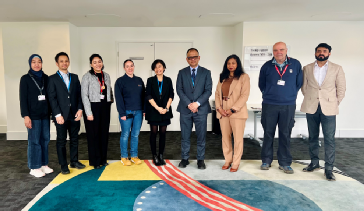 Dr. Khairul Munadi, Education and Culture Attaché; Mrs. Anggarini Sesotyoningtyas, Head of Economic Department; and Mr. Raksa Permana Ibrahim, Economic Department; were invited to visit by Dr Kogila Balakrishnan, WMG’s Director of Client and Business Development (Southeast Asia).
Dr. Khairul Munadi, Education and Culture Attaché; Mrs. Anggarini Sesotyoningtyas, Head of Economic Department; and Mr. Raksa Permana Ibrahim, Economic Department; were invited to visit by Dr Kogila Balakrishnan, WMG’s Director of Client and Business Development (Southeast Asia).
As a leading international role model for successful collaboration between academia and industry, the guests were particularly interested to hear more about WMG’s work in entrepreneurship and innovation, as well as the department’s extensive SME support programme.
The guests enjoyed a tour of the National Automotive Innovation Centre (NAIC) and the Energy Innovation Centre (EIC), before meeting with Gary Dimmock and Bethany Haynes from WMG’s SME Group.
The visitors also had the opportunity to meet with MSc Innovation and Entrepreneurship Course Director, Dr Ali Ahmad; and Deputy Course Director, Dita Amry; as well as Indonesian students currently studying on the programme.
Dr Kogila Balakrishnan, WMG’s Director of Client and Business Development (Southeast Asia) said: “It was a pleasure to have the opportunity to share the work we are doing here at WMG on both the education and research side. I look forward to further discussions and future collaborations.”
Anggarini Sesotyoningtyas added: “We’re interested in learning more about WMG’s experience in building an effective industry-university R&D collaboration as a means to solve global challenges, such as climate change and energy transition.”
While Dr. Khairul said: “We gained valuable insights from the visit. WMG serves as an outstanding example of bridging academic research with industry-driven demands. This aligns closely with Indonesia's recent focus areas.”
Find out more about WMG SME Group here: SME Support - WMG - University of Warwick
Find out more about WMG’s Master’s Courses here: Master's Degrees | WMG, University of Warwick
Labour leader sees University of Warwick’s industrial impact first hand
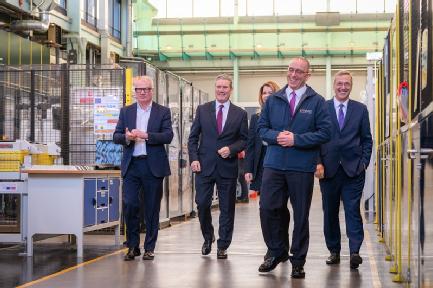 Keir Starmer today visited WMG at the University of Warwick to meet researchers, technicians, and students at one of the world’s leading centres for industrial innovation and skills.
Keir Starmer today visited WMG at the University of Warwick to meet researchers, technicians, and students at one of the world’s leading centres for industrial innovation and skills.
He was joined by Labour’s mayors and mayoral candidates, including Richard Parker (West Midlands), Andy Burnham (Greater Manchester) and Claire Ward (East Midlands).
The Labour leader and the mayors visited WMG’s International Manufacturing Centre (IMC), where Warwick experts work with industrial partners to drive forward innovation in fields such as sustainable transport, connected and autonomous vehicles, agritech and advanced manufacturing.
WMG is an academic department within the University and is widely regarded as an international role model for successful collaboration between academia and the public and private sectors, driving innovation in science, technology, and engineering.
Keir met with the University’s Vice-Chancellor, Professor Stuart Croft, and the Dean of WMG, Professor Robin Clark, and had an opportunity to see innovative projects such as Warwick Racing, Warwick Moto, and the Driving the Electric Revolution programme for novel electric motors for use in electric transport.
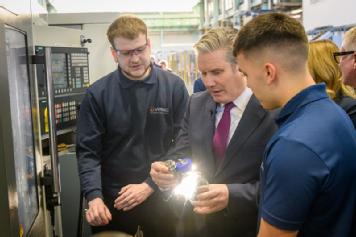 Speaking after the visit, Keir said: "I was delighted to visit WMG at the University of Warwick today to hear about their pioneering work to drive growth through its support for business and industry. We need the UK’s universities to be central to our future economic growth, through their contributions to innovation, sustainability, and the talents of our people.
Speaking after the visit, Keir said: "I was delighted to visit WMG at the University of Warwick today to hear about their pioneering work to drive growth through its support for business and industry. We need the UK’s universities to be central to our future economic growth, through their contributions to innovation, sustainability, and the talents of our people.
"Meeting some of the University’s impressive researchers, technicians and students, who are working on the technology of the future, their driving purpose is what an incoming Labour government will bring, if we are privileged enough to serve. We’ll work hand in hand with universities, sixth forms and further education colleges to deliver on each of our five missions to give Britain its future back.”
Vice Chancellor, Professor Croft said: “We were pleased to host the Labour leader and the mayors and mayoral candidates to show them some of the cutting-edge research and product development which takes place here on our campus.
“The University of Warwick is unique with respect to the way it has worked hand-in-glove with industry and businesses for decades, developing innovative products and services with them and finding real-world solutions to complex problems. Collaboration, openness, and creativity is at the heart of our approach, which has led to a host of breakthrough technologies and innovations.”
Dean of WMG, Professor Robin Clark, added: “At WMG, we focus on working with industry to create real innovation to drive growth in our economy, and give people the practical skills to make a difference to the world around them. It was a pleasure to introduce Keir to our researchers, technicians and students who are really helping make our country more sustainable, safer, and prosperous.”
The University of Warwick is ranked as one of the world’s best universities, with 92% of its research rated as world-leading or internationally excellent.
Prime Minister Rishi Sunak visits University of Warwick for Horizon policy announcement
The Prime Minister visited the University of Warwick, on Thursday 7th September, where he announced the UK would re-join the EU’s flagship research scheme, Horizon.
The move means that UK-based researchers and innovators will be able to access funding from the £85 billion programme, in what has been widely hailed as a major boost for the higher education sector.
Rishi Sunak said it was the ‘right deal for the UK’ as he confirmed that the UK would be re-joining Horizon as an associate member.
The Prime Minister chose to make the major policy announcement at Warwick, which has a world-class reputation for science and innovation, and has close ties with research partners across Europe.
During the visit, he was given a tour of the university’s International Manufacturing Centre by Robin Clark, Dean of WMG, and Emma Flynn, the University’s provost.
Earlier, the Prime Minister had held a private conversation with university leaders, Sir David Normington (Chair); Professor Emma Flynn (Provost); Rachel Sandby-Thomas (Registrar), and Dr Chris Twine (Secretary to Council).
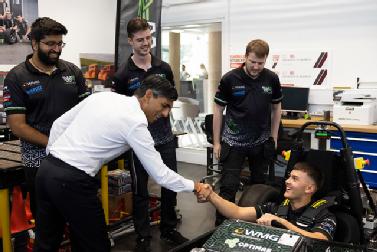 The International Manufacturing Centre – part of WMG - is one of the biggest buildings on campus, and at the heart of the University’s technological research and testing. A variety of projects have been undertaken with global companies to develop new products or improve processes at the centre.
The International Manufacturing Centre – part of WMG - is one of the biggest buildings on campus, and at the heart of the University’s technological research and testing. A variety of projects have been undertaken with global companies to develop new products or improve processes at the centre.
Professor Emma Flynn, the University’s Provost, said: “We were delighted to host the Prime Minister today and welcomed the opportunity to showcase some of the cutting-edge technology and innovation we have here at Warwick.
“The fact the Prime Minister chose to come to Warwick to make such a major announcement on science funding gives me a sense of enormous pride in our brilliant academics and researchers, who have built our reputation as a world-leading university on science, innovation and research over many years.
“The announcement today on Horizon funding is fantastic news for Warwick and the wider university sector and will help drive research excellence and collaboration with our partners.
“This deal will make help us address and make a positive difference to the environmental, economic, and social challenges we all face.”
Sir David Normington, chair of Council and Pro-Chancellor, added: “We were delighted to welcome the Prime Minister to Warwick, and are grateful for his interest in our work at the University. Today’s announcement is great news for everyone. Allowing our scientists to work together, irrespective of borders, is in all of our interests.
“As a former civil servant, I also recognise the hard work of the negotiating team who secured this deal in the background, and they deserve great credit.”
The UK will also associate to Copernicus, the European Earth Observation programme. This will provide the UK’s earth observation sector with access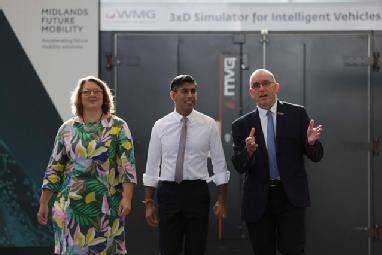 to unique data – valuable to helping with early flood and fire warnings, for example – and with the ability to bid for contracts, which they have not been able to access for three years.
to unique data – valuable to helping with early flood and fire warnings, for example – and with the ability to bid for contracts, which they have not been able to access for three years.
The University of Warwick is ranked as one of the world’s best universities, with 92% of its research rated as world-leading or internationally excellent.
WMG welcomes delegation from the Indian Mission on Design and Advanced Technologies to the United Kingdom
On Wednesday (20th September) Professor Robin Clark, Dean of WMG, was pleased to welcome guests from the Indian Mission on Design and Advanced Technologies to the United Kingdom. The visit had been arranged through the Confederation of Indian Industry (CII).
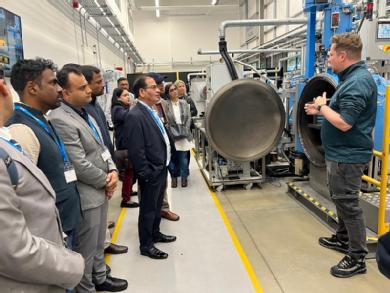 The delegation was made up of representatives from the Department for Business and Trade, and a number of companies including Tata Steel; Dynamatic Technologies Limited; Metrochem Metal Powers; DRDO; Norton Motorcycles; TVS Motor UK; Maruti; Bucket Design; Carborundum Universal Ltd; Two Design; Godrej Consumer Products, Ghaison Bikes plus attendees from IIT Roorkee.
The delegation was made up of representatives from the Department for Business and Trade, and a number of companies including Tata Steel; Dynamatic Technologies Limited; Metrochem Metal Powers; DRDO; Norton Motorcycles; TVS Motor UK; Maruti; Bucket Design; Carborundum Universal Ltd; Two Design; Godrej Consumer Products, Ghaison Bikes plus attendees from IIT Roorkee.
The guests were particularly keen to hear more about WMG’s research and education programmes and partnerships, with a clear focus on skills – including upskilling and reskilling.
Introductions were made from Dr Debashish Bhattacharjee, Vice President, Technology and R&D Tata and Chairman, CII National Task Force on Advanced Materials; and Udayant Malhoutra, CEO and Managing Director Dynamic Technologies Ltd and Chairman, CII National Task Force on Advanced Materials.
Mikhil Gandhi, Business Development Manager for Advanced Manufacturing at the West Midlands Growth Company then explained more about how and why the region has already attracted some of India’s biggest companies; before Professor Robin Clark, Dean of WMG, provided the guests with an insight into WMG’s key strengths, and opportunities for further collaboration.
Finally the guests were shown the Energy Innovation Centre (EIC) the home of WMG’s battery research, before Professor Claire Davis led a tour of the Advanced Steels Research Centre.
Professor Robin Clark, Dean of WMG, explained: “It was a pleasure to welcome representatives from the Indian Mission on Design and Advanced Technologies to the United Kingdom to WMG. Our relationship with India is long standing, and one that we value very highly.”
Read more about the CII’s initiatives here: https://www.cii.in/
WMG welcomes Indian Forum of Parliamentarians
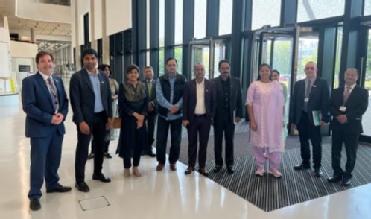 On Friday (16th June) Professor Robin Clark, Dean of WMG; and Professor David Greenwood, CEO of the High Value Manufacturing Catapult and Director of Industrial Engagement at WMG, were pleased to welcome guests from the Indian Forum of Parliamentarians.
On Friday (16th June) Professor Robin Clark, Dean of WMG; and Professor David Greenwood, CEO of the High Value Manufacturing Catapult and Director of Industrial Engagement at WMG, were pleased to welcome guests from the Indian Forum of Parliamentarians.
The delegation was made up of representatives from across various political parties including Shri Rajiv Pratap Rudy, Chair of the Forum of Parliamentarians; Ms. Vandana Chavan - National Congress Party; Shri Krishna Devarayalu Lavu - Yuvajana Sramika Rythu Congress Party; Shri Sujeet Kumar - Biju Janata Dal; Shri N K Premachandran - Revolutionary Socialist Party; and Shri Brijendra Singh - Bharatiya Janata Party.
The guests were particularly keen to hear more about WMG’s research and education programmes in electrification and mobility.
They were given a tour of the real-world demo site of the track system for the Coventry Very Light Rail flagship transport project, before Professor David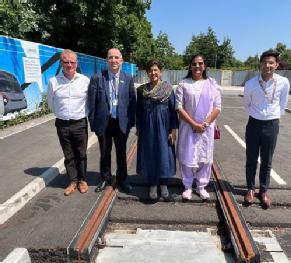 Greenwood led a tour of the Energy Innovation Centre (EIC) the home of WMG’s battery research.
Greenwood led a tour of the Energy Innovation Centre (EIC) the home of WMG’s battery research.
Finally the group heard more about the Warwick Moto project, where engineering students have been tasked with designing, building and racing an electric superbike.
The parliamentarians also had the opportunity to meet with Indian PhD students and researchers, studying and working at WMG.
Professor Robin Clark, Dean of WMG, explained: “ It was a pleasure to welcome the group of Indian Parliamentarians. Our relationship with India is long standing, and one that we value very highly.
“One example of our commitment is the strength of our relationship with IIT (Indian Institute of Technology) Kharagpur, whom in October 2022 we signed a Memorandum of Understanding (MoU) for a further five years, having first started in 2006.
We are increasingly appreciating the breadth of opportunity India presents, both in the academic and industrial spaces. As India is our main focus internationally at present, we expect to see more visits and more projects over the coming months and years!”
WMG welcomes Richard Parker
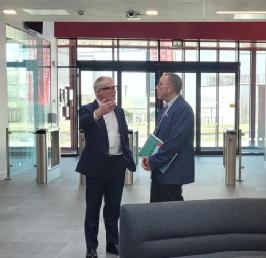 Professor Robin Clark, Dean of WMG welcomed Richard Parker, the Labour Party candidate for the Mayor of the West Midlands, to see WMG’s work on skills and innovation and to meet students, technicians and researchers who are working with West Midlands businesses to support industrial innovation and sustainability.
Professor Robin Clark, Dean of WMG welcomed Richard Parker, the Labour Party candidate for the Mayor of the West Midlands, to see WMG’s work on skills and innovation and to meet students, technicians and researchers who are working with West Midlands businesses to support industrial innovation and sustainability.
Following his selection for the West Midlands Mayoralty, Richard Parker is looking to develop his understanding of the West Midlands’ industrial innovation field to shape his manifesto.
Professor Robin Clark took him on a tour of WMG’s research and education facilities including the Degree Apprenticeship Centre where he had the opportunity to meet and chat to WMG apprentices and hear more about the WMG Skills Centre.
Following this, he went on to visit the real-world demo site of the track system for the Coventry Very Light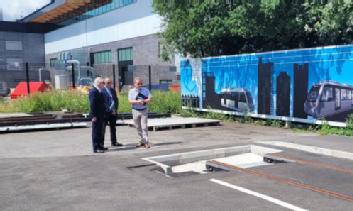 Rail flagship transport project, before receiving a tour of the Energy Innovation Centre (EIC) to hear more about WMG’s transport electrification projects with companies including Tata, Norton and Lotus.
Rail flagship transport project, before receiving a tour of the Energy Innovation Centre (EIC) to hear more about WMG’s transport electrification projects with companies including Tata, Norton and Lotus.
Professor Robin Clark, Dean of WMG, said: “It was a pleasure to welcome Richard Parker to WMG.
“We were pleased to have the opportunity to demonstrate our commitment to developing new engineering and manufacturing skills to help bridge the gap between academia and industry; and the chance to showcase our projects supporting productivity and sustainability in the region.”
George Freeman MP, Minister for Science, Innovation and Technology visits WMG at the University of Warwick
George Freeman MP, Minister of State in the Department for Science, Innovation and Technology has visited the University of Warwick.
The Minister was given a tour of the Centre for Imaging, Metrology and Additive Technologies where he heard about WMG’s ground-breaking research in advanced measurement techniques (metrology), Micro-CT scanning and additive manufacturing (3D printing).
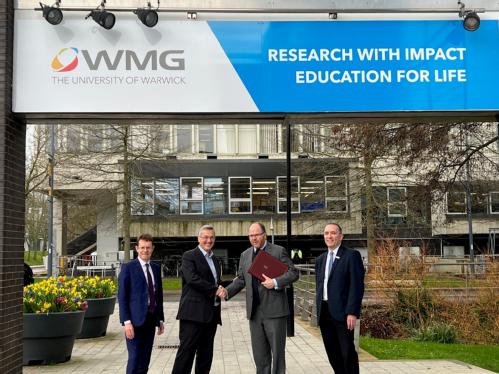
Professor Mark Williams explained how the University is working with a team in Kharkiv, Ukraine, to develop software that rapidly identifies life-threatening injuries so they can prioritise who needs emergency surgery soonest.
Minister of State at the Department of Science, Innovation and Technology, George Freeman, said: “This ground-breaking digital advanced imaging software is one of the outstanding technologies being developed by Warwick University researchers & companies in the Warwick manufacturing & engineering cluster, but also the range of applications of these digital technologies to deliver transformational improvements from cutting NHS waiting times, one of the PM’s Top 5 priorities, to advanced digital twin manufacturing, to forensic & materials science. This is world class digital innovation supporting transformational innovation here in the West Midlands cluster being developed by Mayor Andy Street with local Universities & businesses.”
Stuart Croft, Vice Chancellor of the University of Warwick said: “I’m delighted to welcome the Minister to our campus and to be able to showcase some of our ground-breaking research to him.
“We have a proven track record of working closely with a wide range of partners to find solutions to real world challenges which have a tangible impact on society.
“The research we have shown him today, to speed up the triaging process for injured people, is just one example of how our research can have positive impact. We’re helping to save lives in emergency situations through this new technology.”
Professor Mark Williams, WMG at the University of Warwick, said: “As well as being useful in other emergency situations such as earthquakes, the research is also applicable to doctors in trauma wards – already stretched by pressures experienced by the NHS – who need to triage patients quickly.
“At WMG, we will be using 3D imaging to create replicas of human anatomy and shrapnel wounds. These will act as ‘test objects’, which experts in computer science can then use to calibrate their technology and AI programme.”
Based in the International Manufacturing Centre at WMG, CIMAT hosts Metrology, X-ray Computed Tomography, and Additive Manufacturing capabilities. There is a wide range of scanning technologies for the 3D characterisation and validation of complex internal and external architectures, including high resolution laser scanning, microfocus CT and immersive visualisation. The additive technologies capabilities include the development and application of advanced functional metallic and multi-material solutions for exploitation in the high value manufacturing sector.
WMG is considered a leading international role model for successful collaboration between academia and the public and private sectors by successive UK Governments.

